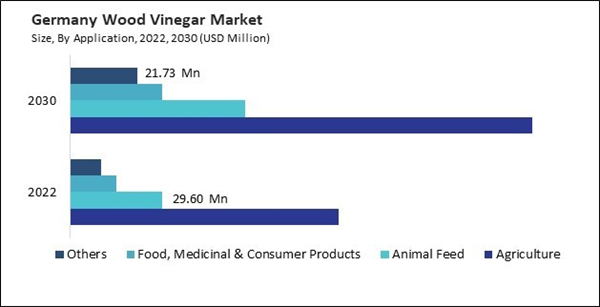By incorporating wood vinegar into feed, livestock producers aim to enhance overall animal health, improve digestion, and mitigate the risk of diseases. Wood vinegar's antimicrobial properties help to control pathogens in the gastrointestinal tract, reducing the need for antibiotics and promoting gut health in poultry, swine, and ruminants. Therefore, the UK market will utilize 7.32 tonnes of wood vinegar in animal feed in 2030.
The Russia market dominated the Europe Wood Vinegar Market by Country in 2022 and would continue to be a dominant market till 2030; thereby, achieving a market value of $612.4 Thousands by 2030. The France market is exhibiting a CAGR of 5.8% during (2023 - 2030). Additionally, The Germany market would experience a CAGR of 7.9% during (2023 - 2030).
Integrating biomass conversion plants offers a holistic approach to wood vinegar production by co-utilizing various biomass feedstocks and byproducts to maximize resource efficiency and value creation. Integrated plants combine pyrolysis units with complementary processes such as biochar production, bio-oil extraction, and syngas generation, allowing for the efficient utilization of biomass feedstocks and the production of multiple value-added products. By leveraging synergies between different process streams, integrated biomass conversion plants enhance economic viability, environmental sustainability, and overall process efficiency.
In addition, the expanding applications of wood vinegar beyond traditional uses are opening up new market opportunities. From aquaculture and horticulture to wastewater treatment and air purification, industries are exploring innovative ways to leverage the unique properties of wood vinegar for diverse applications. Wood vinegar's soil conditioning properties and plant growth-promoting effects make it a valuable asset in horticulture and gardening. When applied to soil or used as a foliar spray, wood vinegar enhances nutrient uptake, improves soil structure, and stimulates root development, leading to healthier, more resilient plants with increased yields and quality. Moreover, wood vinegar's natural pest-repellent properties offer potential benefits in pest management, reducing the need for synthetic pesticides and minimizing environmental impacts.
Organic farming in the UK strongly emphasizes soil health and sustainability. Wood vinegar's ability to improve soil structure, enhance nutrient uptake, and promote microbial activity makes it a valuable tool for organic farmers to maintain healthy and fertile soils without relying on synthetic fertilizers or chemical additives. Thus, rising organic farming practices in Europe will lead to increased demand for wood vinegar in the region.
Based on Pyrolysis Method, the market is segmented into Slow Pyrolysis, Fast Pyrolysis, and Intermediate Pyrolysis. Based on Application, the market is segmented into Agriculture, Animal Feed, Food, Medicinal & Consumer Products, and Others. Based on countries, the market is segmented into Germany, UK, France, Russia, Spain, Italy, and Rest of Europe.
List of Key Companies Profiled
- VerdiLife Inc.
- Sane Shell Carbon Pvt. Ltd.
- Ace (Singapore) Pte Ltd.
- Nettenergy BV
- TAGROW CO., LTD.
- Applied Gaia Corporation
- Penta Manufacturing Company, LLC
- Byron Biochar
- Taiko Pharmaceutical Co., Ltd.
- Doi Shoten Co., Ltd.
Market Report Segmentation
By Pyrolysis Method (Volume, Tonnes, USD Million, 2019-2030)- Slow Pyrolysis
- Fast Pyrolysis
- Intermediate Pyrolysis
- Agriculture
- Animal Feed
- Food, Medicinal & Consumer Products
- Others
- Germany
- UK
- France
- Russia
- Spain
- Italy
- Rest of Europe
Table of Contents
Companies Mentioned
- VerdiLife Inc.
- Sane Shell Carbon Pvt. Ltd.
- Ace (Singapore) Pte Ltd.
- Nettenergy BV
- TAGROW CO., LTD.
- Applied Gaia Corporation
- Penta Manufacturing Company, LLC
- Byron Biochar
- Taiko Pharmaceutical Co., Ltd.
- Doi Shoten Co., Ltd.









